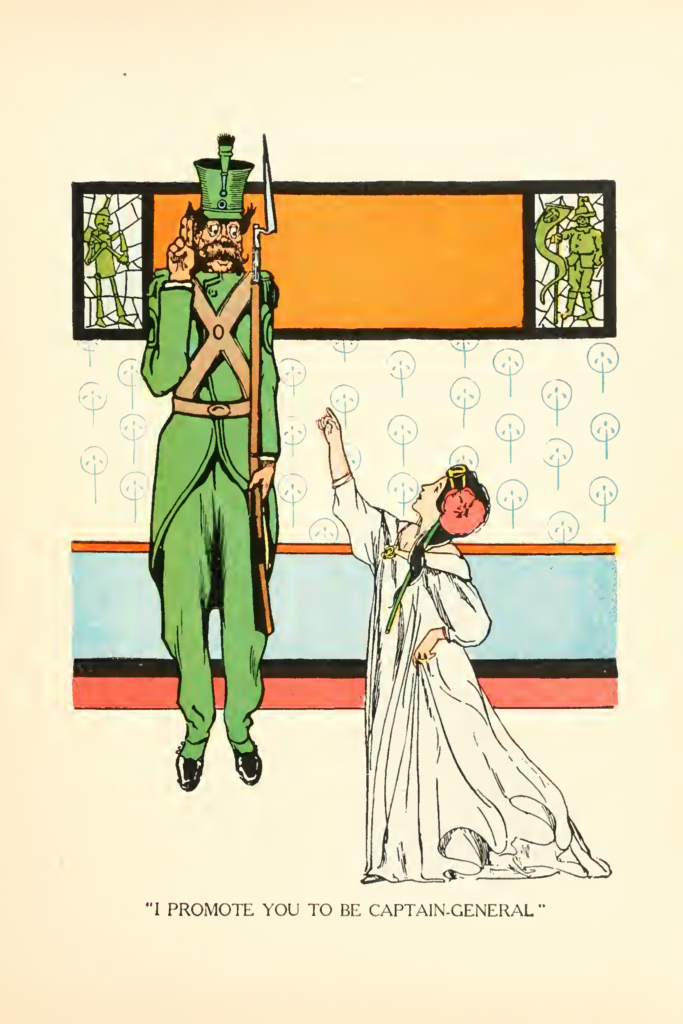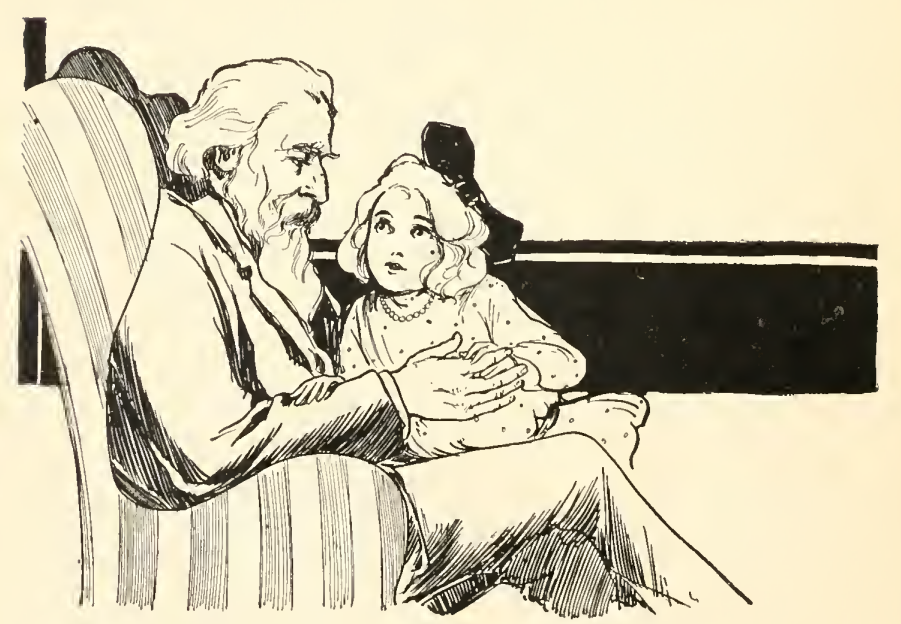Watching Tiktok’s crying scene in the film, I considered the only crying scene in Ozma of Oz. The Scarecrow scolds one of his soldiers for weeping over the loss of the Tin Woodman:
One of the generals began to weep dolefully.
“What are you crying for?” asked the Scarecrow, indignant at such a display of weakness.
“He owed me six weeks back pay,” said the general, “and I hate to lose him.”
“Then you shall go and find him,” declared the Scarecrow.
“Me!” cried the general, greatly alarmed.
“Certainly. It is your duty to follow your commander. March!” (183)
Instead of affection, Baum has military hierarchy, a rejection of vulnerability, and a joke about the characters’ financial pettiness. The Scarecrow doesn’t seem to care that his beloved friend the Tin Woodman might be gone forever! Why does Baum value a joke about bureaucracy over, say, the Scarecrow expressing sadness over his friend? There would be room for both. A display of sadness or compassion would make the reader happier when the Tin Woodman is later recovered, as well, because it would have felt like a genuine loss being recovered. It would have felt, in other words, like what happens to Tiktok in Return to Oz. Instead, this is all the Scarecrow says of the matter: “Poor Nick! I wonder what has become of him” (243). Did Baum forget that the Scarecrow loves the Tin Woodman? Apparently not, since Baum is convincing in showing the Scarecrow’s joy upon the Tin Woodman’s recovery: “The Scarecrow had fairly thrown himself upon the bosom of his old comrade, so surprised and delighted was he to see him again” (250).

The second reason that Ozma of Oz is a less affecting story is that it demonstrates a rather medieval hierarchical morality that is difficult to empathize with. To begin, Dorothy, Ozma, and the others are on a quest to free Evoldo’s family from slavery to the Nome King. Baum seems to assume that the ascension of Evardo Fifteenth to the throne of Ev is a happy ending. But is it? Langwidere is completely horrible, Evoldo was explicitly a serial murderer, and aside from giving these two power, the system of laws they uphold is obviously unjust, including, as the Nome King mentions, that the monarch can never be wrong, so whatever he does is right (165). They are no better than the Nome King. The problem is the very form of government, not which prince is in charge. We can’t all be so lucky as to have benevolent child dictators like Ozma. Yet Ozma restores the Ev monarchy without any further concern. What, does Ozma not want to set a precedent that would see her relinquish power to the people? This might obviously be reading too much into a fairy tale, yes, but let’s do it anyway.
Tiktok maintains that the Nome King’s actions are not immoral, given that he bought the slaves fair and square from Evoldo so that it was Evoldo alone who did wrong (129). Furthermore, as mentioned above, Tiktok makes a point that he is Dorothy’s slave. While this likely reflects Tiktok’s previous life under Evoldo, Dorothy never objects or seems to particularly care. And reconsider the Wheelers. Scary enemies when they do not obey the Ev monarchy, they gain sympathy in the ending specifically as, in a celebratory scene, they “loudly promised to obey the new King” (253, emphasis mine). Obey the king! Obey! Even though the last few were so awful no ethical person should have obeyed them.
It is as if the Nome King’s real crime is that he enslaves royalty, as opposed to non-royal beings, like Glinda the Good does the Flying Monkeys (it’s only evil when the Wicked Witch of the West does it). The rightness and wrongness of an action, except for the reckless disobedience that gets Dorothy to Ev instead of killed in the opening chapter, depends on whether that action supports or disrupts a monarchist hierarchy.
Despite all this, Baum also shows disrespect for monarchy, having Dorothy refuse to show the very unsympathetic Princess Langwidere any deference:
“I thought some one of importance had called.”
“Then you were right,” declared Dorothy.
[…] “Stop—stop!” commanded the Princess, with an angry flash of her splendid eyes. “How dare you annoy me with your senseless chatter?”
“Why, you horrid thing!” said Dorothy, who was not accustomed to being treated so rudely.
[…] “Tell me,” she [Langwidere] resumed, “are you of royal blood?”
“Better than that, ma’am,” said Dorothy. “I am from Kansas” (95–96).
The struggle with the Nome King is exciting, but, under the hood, we have a royal rescuing unsympathetic royals from another unsympathetic royal. Even this could be engaging, say if Dorothy was in a sort of Escape from New York scenario (save the president, even though he sucks). Perhaps Dorothy is simply too childish to realize the politics of the situation she finds herself in. That could be interesting. But the idealized fairy tale dictator, Ozma, suggests that Baum intends the scenario to be taken at face value. The issue is that Baum buys into his monarchy fantasy. He assumes the reader will feel particularly bad for the Royal Family of Ev, despite clearly showing why the monarchy should end, even if it is also heroic to liberate slaves from the Nome King regardless of the moral character of the enslaved people. Maybe my politics are just screaming, “HAVE THEM FREE JUST NORMAL PEOPLE WHO ARE ENSLAVED, WHY A BRUTAL ROYAL FAMILY, AAGGHH” too loudly for me to focus. Having Dorothy instead rescue her beloved friends in Return to Oz was a wise move. Like The Marvelous Land of Oz, Ozma of Oz is full of tensions as interesting as the story itself. Unlike in The Marvelous Land, however, they are definitely not more interesting than the story.
The fourth Oz novel is Dorothy and the Wizard in Oz, probably the strangest one so far and certainly the most violent. Please read my post about it too. Thank you for reading.
